The musculoskeletal system is made up of bones, muscles, nerves, and joints. When a person gets injured, they may visit an orthopedist or orthopedic surgeon.
As an example, 16% of musculoskeletal injuries in the US are fractures. In fact, six million people break their bones every year.
There are many other orthopedic conditions, including osteoarthritis, torn ligaments, and dislocations.
Orthopedic assistants support the orthopedic team. They have a number of duties, including administrative tasks and patient education.
You might be considering an orthopedic assistant for your clinic, but how much do they make?
We’ve put together this salary guide, so you can make the right decision. Plus, we’ll tell you how a Healthcare Virtual Assistant (HVA) can save you money.
What is an orthopedic assistant?
An orthopedic assistant can work in a hospital, private practice, or orthopedic clinic. They work as part of a team and are supervised by orthopedic surgeons and physicians.
The types of conditions they treat are musculoskeletal. Fractures, tears, and sprains are common, and injuries can occur for different reasons. For example, patients can be injured playing sports. Alternatively, they may have been in an accident, or the injury could be work-related.
Orthopedic assistants greet patients and answer phone calls. They also fit equipment, such as crutches, splints, and braces.
Part of the job involves patient education, and they perform diagnostic procedures, such as x-rays and ultrasounds.
You can read our orthopedic assistant guide to learn more about the role.
If you need clerical assistance, an HVA could be a good alternative. Contact Hello Rache today to find out how our experienced virtual team can reduce your workload with minimal fuss.
How much does an orthopedic assistant make?
The average salary for an orthopedic assistant in the US is $32,430 per year, or $15.59 an hour. The salary range is between $27,588 and $37,371 per year.
Orthopedic assistants in the 25th percentile make $29,895, while those in the 90th percentile make $37,371.
The median salary can vary depending on various factors, including the person’s skill level, experience, and education.
There can also be salary increases and bonuses for those who have been with the company for a while.
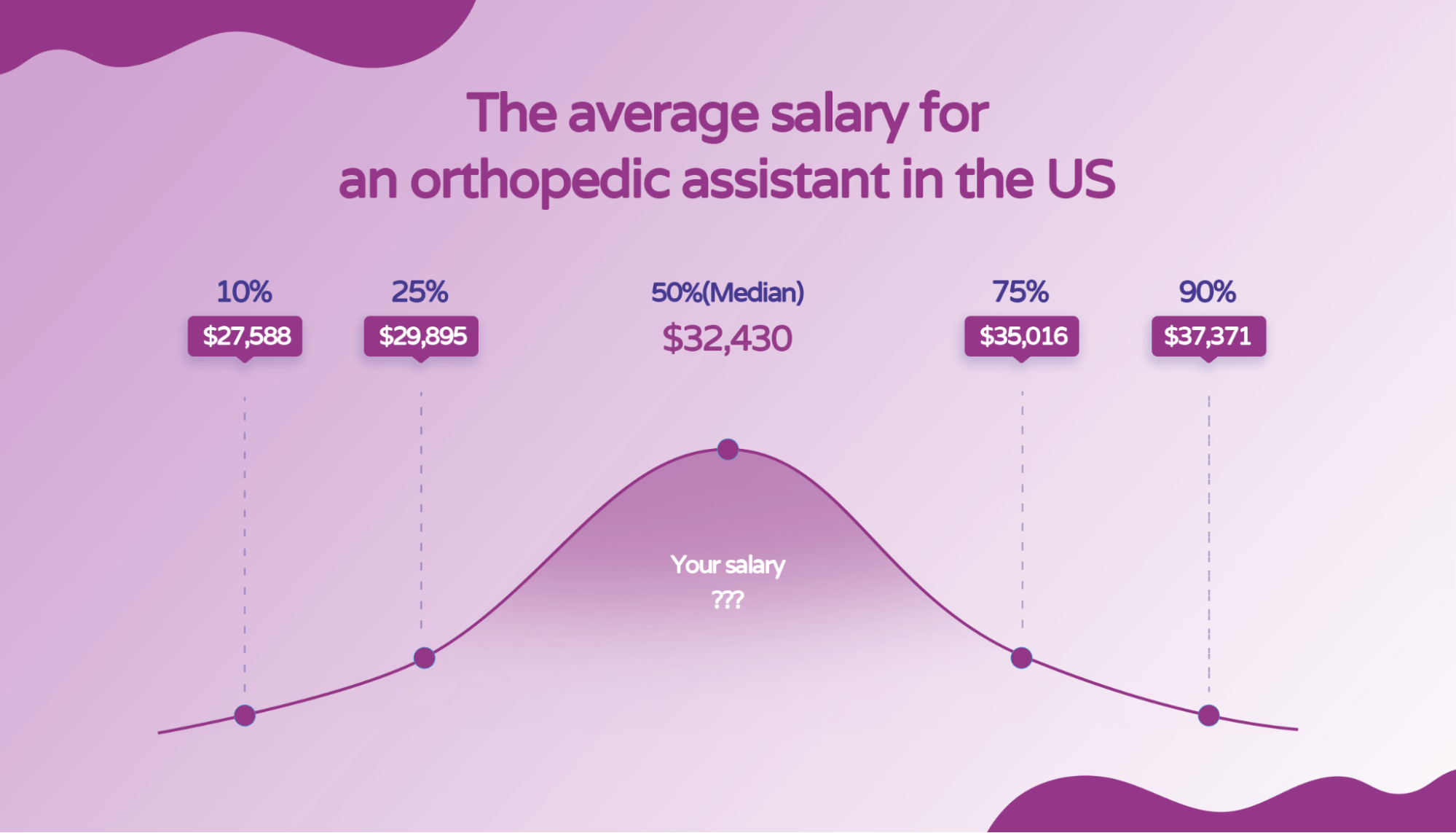
If someone has more than five years of experience, the average pay goes up by $463. The average salary is $32,893 per year.
Compare these rates to a Healthcare Virtual Assistant. When you use a team member from Hello Rache, the cost is just $9.50 per hour.
It’s a flat rate, and there are no overtime or sign-up fees. You can get all of the office assistance you need at a fraction of the cost of a new employee.
How does the orthopedic assistant salary vary between states?
Where you live can have an impact on wages. You know the national average, but how does the orthopedic assistant’s base salary vary between locations?
In New York, the annual salary range is above average. The typical salary is $39,013, but workers can make up to $42,124 a year.
California is another high-paying state. The average salary for orthopedic assistants is $36,224 per year.
Texas is slightly below average. In this area, the median salary is $31,845. In North Dakota, the average annual salary is $30,451, and in South Carolina, it’s $30,354.
Those in Arizona can make between $29,532 and $34,591 per year. The salary range is slightly higher in Colorado, where orthopedic assistants make between $30,233 and $35,412 per year.
Compare this to Hawaii, where the average is between $31,366 and $36,739 per year.
What benefits do orthopedic assistants get?
Most orthopedic assistants work full-time, and this type of employment comes with a range of benefits.
The most common benefits include health insurance, with perks such as medical, dental, vision, and prescription coverage.
Orthopedic assistants usually get a 401(k) retirement plan with a company match. Plus, disability insurance, life insurance, and paid time off (PTO) are usually part of the mix.
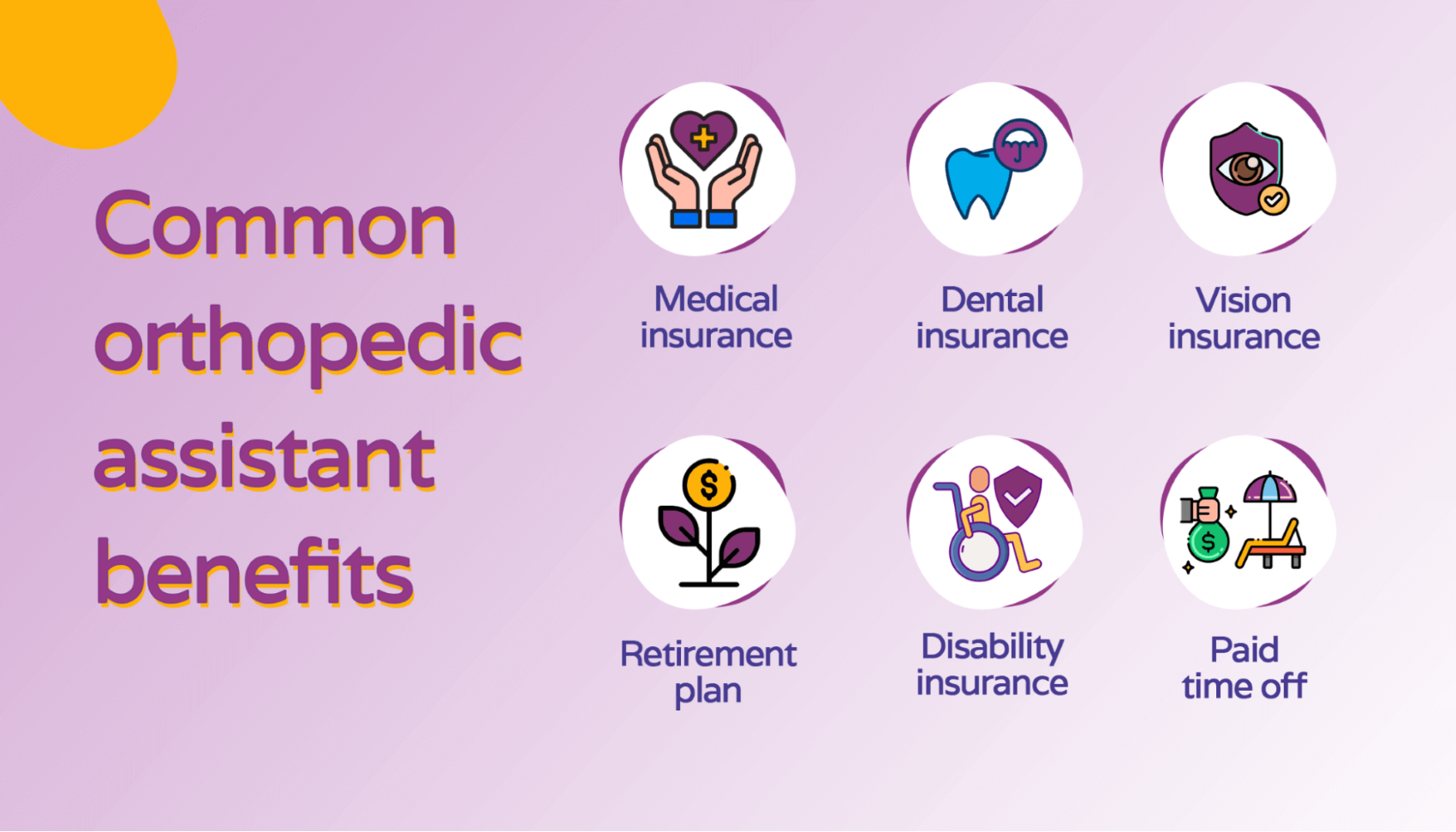
There can be other benefits depending on the health organization and the location. For example, orthopedic assistants may get flexible spending accounts (FSAs), paid parental leave, and tuition reimbursement.
If you use an HVA instead of an in-person assistant, you won’t have to think about benefits.
How do you become an orthopedic assistant?
Most orthopedic assistants have a high school diploma, training, and certification. Depending on where you live, certification can be voluntary through the NBCOPA (National Board for Certification of Orthopedic Physician’s Assistants).
It’s not uncommon for workers to have an associate’s degree.
One of the job requirements is working with patients, so life support training and first aid are essential.
The next step for an orthopedic assistant is to become a physician assistant in the field of orthopedics. To do this, they’ll need advanced training and a master’s degree.
What skills does an orthopedic assistant need?
If you’re thinking about hiring an orthopedic assistant, put these skills on your must-have list.
Don’t forget that an HVA will have most of the same skills but can be accessed remotely.
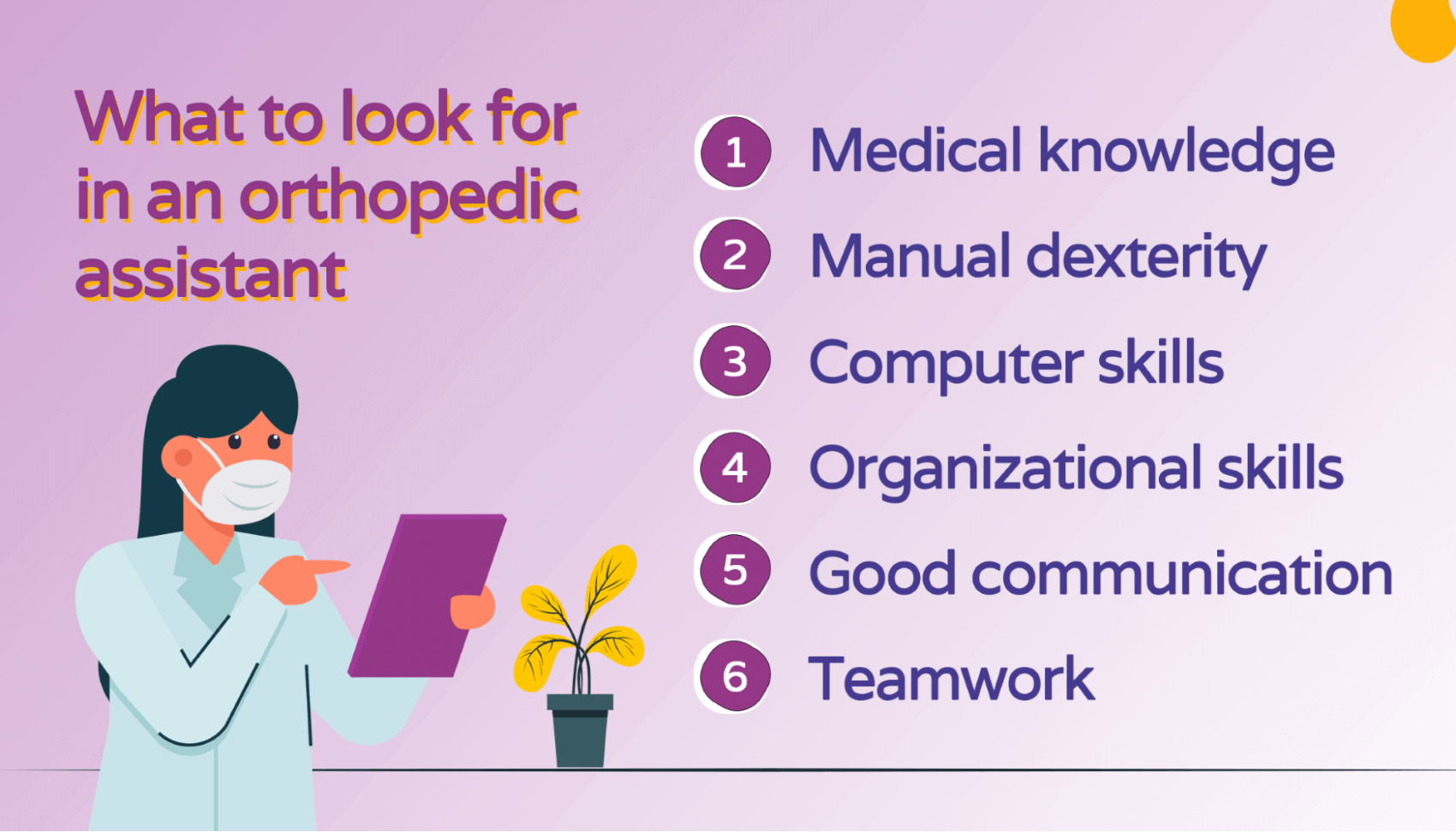
1. Medical knowledge
Orthopedic assistants need medical knowledge, and they’ll get this through training and experience.
They should understand the ins and outs of anatomy and physiology and be confident using medical terminology.
They’ll also need to know how to use different types of medical equipment. For example, their job may include applying and removing casts and using supportive equipment such as crutches.
Some orthopedic assistants are present during orthopedic surgery, so they should feel comfortable in this setting.
2. Manual dexterity
Manual dexterity and physical strength are a requirement for this role. Orthopedic assistants help with patient treatment and may need to pass instruments during surgery.
They need to apply casts accurately and show patients how to use different equipment.
Orthopedic assistants educate patients and may show them how to do exercises. These exercises will help with their recovery.
3. Computer skills
Computer skills are essential in any healthcare setting. Part of the job is administrative, and the orthopedic assistant needs to be tech-savvy.
They need to type quickly and accurately and be familiar with common software such as Microsoft Office and Google Workspace.
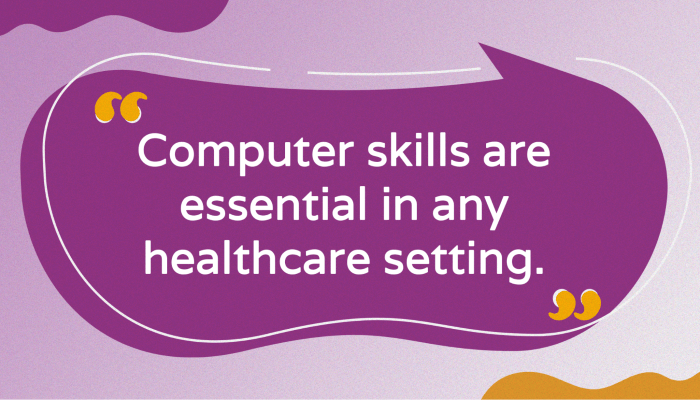
Orthopedic assistants also need to use healthcare software to make bookings and update patient records.
4. Organizational skills
As healthcare professionals, orthopedic assistants need to be highly organized. They support the physician during clinic hours, so they need to get to work on time.
They’re responsible for keeping the workspace tidy, including the stockroom. They reorder supplies before they run out and help set up the operating room.
Orthopedic assistants make sure digital files are updated regularly and stored securely.
5. Communication skills
Orthopedic assistants give care to patients in person and over the phone. They work closely with other healthcare professionals, such as orthopedic surgeons, nursing assistants, and physiotherapists.
To be successful, they need excellent communication skills. Listening skills, confidence, good body language, and written communication skills are essential.
Sometimes, patients will feel nervous or distressed. The orthopedic assistant should be calm and friendly to put them at ease.
6. Teamwork
It’s a team environment, and there can be collaboration between healthcare workers.
An orthopedic assistant should be a team player and willing to help colleagues when required. They should do their job properly and check in regularly with their supervisor.
If you have a Healthcare Virtual Assistant, you can reduce the orthopedic assistant’s administrative workload so they can focus on patient care.
How can a Healthcare Virtual Assistant support your orthopedic team?
You don’t need to hire a new employee to get support in your orthopedic clinic. A virtual assistant can help you get on top of your administrative tasks.
Our team can answer phone calls and schedule appointments. They can update patient files, transcribe documents, and process insurance.
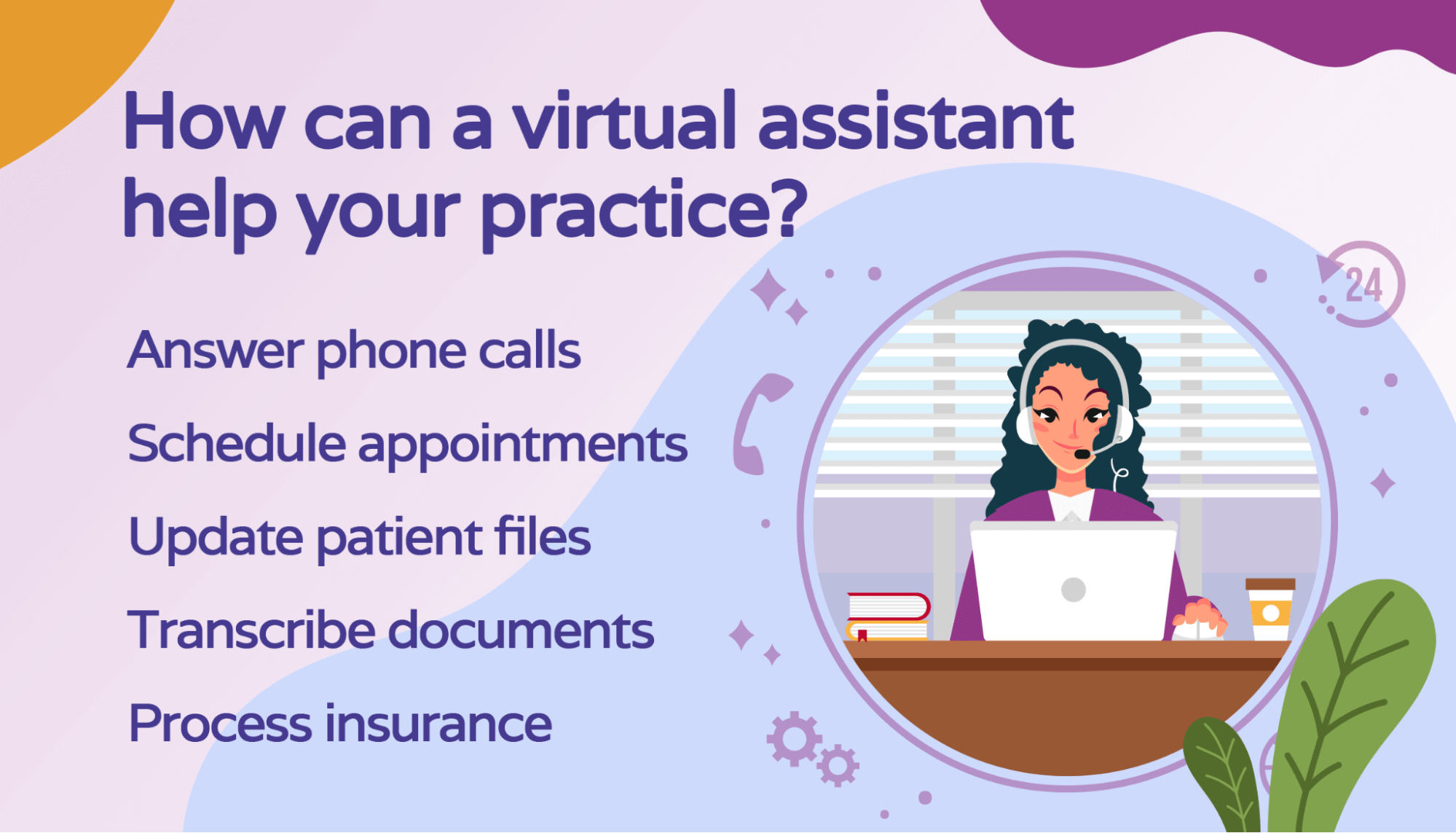
Our HVAs have completed HIPAA training and come with experience in the healthcare field. They’re efficient and accurate and can work seamlessly with the rest of your team.
When you choose a Healthcare Virtual Assistant from Hello Rache, you won’t need to think about extra office space. Our team members are remote and have all the tools they need for the job.
We’ll save you time and money and give your existing employees a better work-life balance.
The average orthopedic assistant salary
Orthopedic assistants work with patients who have musculoskeletal conditions. They perform a variety of tasks, including diagnostics, treatments, and clerical duties.
If you’re considering an orthopedic assistant for your clinic, try to find someone with the right skills. For example, they should have medical knowledge, manual dexterity, computer skills, and good organizational skills. Plus, look for communication skills and teamwork.
After reading this article, you’ll know about the average base salary for orthopedic assistants and how this can vary between locations.
If you need assistance but want a cost-effective alternative, try an HVA from Hello Rache. There’s no long-term commitment, and our services can be a game changer. Get in touch to find out more.





